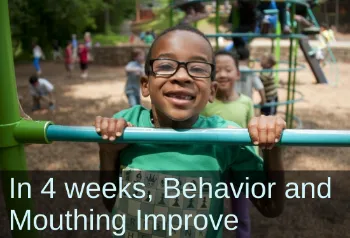Primitive Reflex Integration Case Studies
6-Year-Old Boy: No More Hitting, Biting, and Constant Moving
Help for focus and behavior issues.
Rhythmic movements and primitive reflex integration helped this 6-year-old boy to get through the school day with greater calm, better behavior, and less fidgeting.
Submitted by Latasha Winford, Occupational Therapist

| Before | After |
|---|---|
| Challenges staying in his chair and focusing during the school day | Experiencing longer periods of rest and focus |
| Would run from one end of the house to the next unless given a tablet | Is no longer constantly moving |
| Throwing, hitting, and mouthing | Throwing, hitting, and mouthing are reduced |
I had a young 6-year-old boy without a diagnosis but had many challenges staying in his chair and focusing during the school day. His parents reported he would often be out of his seat chewing on his clothing and dancing around the classroom. At home if they didn’t give him the tablet he would run from one end of the house to the next.
I did test his primitive reflexes [from the Brain and Sensory Foundations course] and he was positive for Babkin (5 left and right), babinski (3 left and right), spinal gallant (4 left and right) and TLR (3/4) [Tonic Labyrinthine Reflex].
Understanding his sensory system from the point of reflex integration allowed me to design a protocol for proprioception based on more than his muscles. But I looked at it from the point of view that if we can change his neurology by helping him to mature in the areas discussed above then maybe this would be a lifelong problem eradicated.
He did everything very fast, so during the first session I went with his speed to allow him some control. But I often said ‘lets sing the ABC song and try and stay with the beat’. He often managed for 3 letters then moved back to the fast pace.
After carrying out the rhythmic movements and integration exercises [from the Brain and Sensory Foundations course] there was a longer period of rest and focus. Four weeks on and he no longer requires the need for constant moving, he’s not throwing, hitting and mouthing as much. He is not completely stopped chewing things and has some speech delays, but it is improved.
I learned that clients and their families greatly benefit from a service that is geared towards alleviating the problems as quickly as possible. This benefits families financially, reduces stress and allows the child to engage in meaningful occupations at an age appropriate level. From the occupational therapists perspective I can give parents easy goal directed homework that will allow them to see changes in timely fashion.
All my programs have changed based on my new knowledge. More than 50% is made up of reflex integration games and the other half works on specific tasks. I certainly do not know everything regarding this topic but I feel it is fascinating and I look forward to learning as much as possible.
[Edited for length and clarity, emphasis added]
*Disclaimer: The activities in the Brain and Sensory Foundations curriculum make use of the natural processes of neuroplasticity and development that are innately wired in the design of human beings to promote maturity and function. These activities appear to calm, organize, and mature the neuro-sensory-motor systems just as we see in the healthy development of human infants. Individual results may vary, and we do not claim to offer a diagnosis or cure for any specific condition or disorder. The Brain and Sensory Foundations activities appear to improve overall functioning resulting in measurable improvements for a range of conditions as demonstrated in over 1800 case studies from participants.

